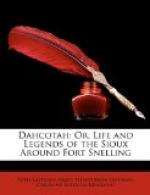When the gentle breeze would play among the prairie flowers, then would she win him from such bitter thoughts. “Come, my brother, we will go and sit by the banks of the lake, why should you be unhappy! the buffalo is still to be found upon our hunting-grounds—the spirit of the lake watches over us—we shall not want for food.”
He would go, because she asked him. The quiet and beauty of nature were not for him; rather would he have stood alone when the storm held its sway; when the darkness was only relieved by the flash that laid the tall trees of the forest low; when the thunder bird clapped her wings as she swept through the clouds above him. But could he refuse to be happy when Wenona smiled? Alas! that her gentle spirit should not always have been near to soften his!
But as the beauty and warmth of summer passed away, so did Wenona’s strength begin to fail; the autumn wind, that swept rudely over the prairie flowers, so that they could not lift their heads above the tall grass, seemed to pass in anger over the wigwam of the old man—for the eye of the Dahcotah maiden was losing its brightness, and her step was less firm, as she wandered with her brother in her native woods. Vainly did the medicine men practice their cherished rites—the Great Spirit had called—and who could refuse to hear his voice? she faded with the leaves—and the cries of the mourners were answered by the wailing winds, as they sang her requiem.
A few months passed away, and her brother was alone. The winter that followed his sister’s death, was a severe one. The mother had never been strong, and she soon followed her daughter—while the father’s age unfitted him to contend with sorrow, infirmity, and want.
Spring returned, but winter had settled on the heart of the young Sisseton; she was gone who alone could drive away the shadow from his brow, what wonder then that his countenance should always be stern. The Indians called him Eta Keazah, or Sullen Face.
But after the lapse of years, the boy, who brooded over the wrongs of his father, eagerly seeks an opportunity to avenge his own. His sister has never been forgotten; but he remembers her as we do a beautiful dream; and she is the spirit that hovers round him while his eyes are closed in sleep.
But there are others who hold a place in his heart. His wife is always ready to receive him with a welcome, and his young son calls upon him to teach him to send the arrow to the heart of the buffalo. But the sufferings of his tribe, from want of food and other privations, are ever before his eyes. Vengeance upon the white man, who has caused them!
CHAPTER II.
Winter is the season of trial for the Sioux, especially for the women and children. The incursions of the English half-breeds and Cree Indians, into the Sisseton country, have caused their buffalo to recede, and so little other game is to be found, that indescribable sufferings are endured every winter by the Sissetons.




